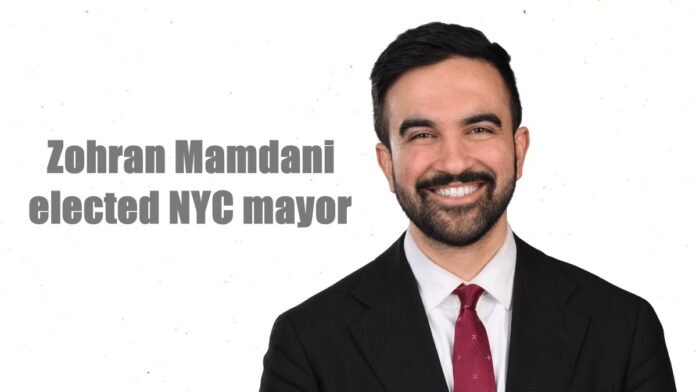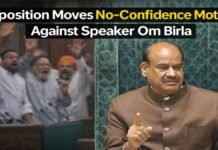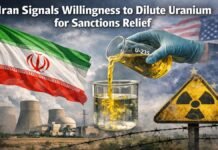
Key Points
- Zohran Mamdani elected NYC mayor on November 4, 2025, becoming city’s first Muslim and first socialist mayor
- Secured 50.4% of votes compared to 41.3% for independent Andrew Cuomo and 7.5% for Republican Curtis Sliwa
- Youngest NYC mayor in a century at age 34; Ugandan-born democratic socialist rises from state assemblyman in unprecedented political ascent
- Record-breaking turnout of over 2 million voters highest since 1969 largely driven by youth voter mobilization
- Defeated Cuomo twice in five months: first in Democratic primary (June 2025) with 55% vs 36%, then in general election
- Defied Trump’s opposition and endorsement of Cuomo; pushed ambitious progressive agenda including rent freezes, free buses, universal childcare
- Faces scrutiny over anti-Israel positions and prior anti-police rhetoric but energized Democratic grassroots nationwide
New York: Zohran Mamdani has made history by winning the New York City mayoral election on November 4, 2025, defeating former Governor Andrew Cuomo and Republican Curtis Sliwa in a decisive victory that signals shifting American political dynamics in the post-Trump era.
From Underdog to Historic Mayor
The 34-year-old democratic socialist’s stunning ascent from a virtually unknown state assemblyman to leader of America’s largest city represents one of the most remarkable political transformations in modern U.S. electoral history. With approximately 50.4% of the vote tallied, Mamdani triumphed decisively over independent candidate Cuomo’s 41.3%, while Republican Curtis Sliwa garnered only 7.5%, marking a resounding rebuke of traditional political establishments.
Mamdani will become the first Muslim mayor in New York City’s 375-year history and the first explicitly socialist mayor to lead the metropolis, breaking centuries of political convention. His election culminated a whirlwind campaign that began merely one year prior, when the Democratic Socialists of America member launched his initial bid as a largely overlooked state lawmaker.
Remarkable Primary Upset Against Political Dynasty
Mamdani’s general election victory capped an extraordinary political journey that saw him defeat Andrew Cuomo, scion of one of New York’s most influential political families, not once, but twice within five months. In the Democratic primary held on June 24, 2025, Mamdani decisively bested Cuomo by 12 percentage points after a ranked-choice vote tabulation confirmed his dominance. The primary victory, with Mamdani securing over 545,000 votes, represented a crushing blow to Cuomo’s comeback aspirations following his 2021 resignation over sexual harassment allegations.
Following his primary loss, Cuomo pivoted to an independent candidacy but faced Mamdani again in the general election with similar results, illustrating the democratic socialist’s sustained appeal across voter demographics.
Trump’s Failed Intervention and Political Pressure
The mayoral race became a national flashpoint when former President Donald Trump explicitly endorsed Cuomo on the eve of voting, threatening to withhold federal funding from New York City should Mamdani prevail. Trump deployed inflammatory rhetoric, labeling Mamdani an “anti-Semite” and stating that “only a stupid Jew” would support him, according to media reports of Trump’s social media statements.
Despite unprecedented presidential opposition and warnings from Trump that Mamdani’s election would trigger “economic and social disaster,” voters rejected the former president’s intervention, signaling potential limits to Trump’s influence in urban Democratic strongholds.
Record Youth Turnout Reshapes NYC Politics
The election witnessed transformative voter participation levels, with over 2 million New Yorkers casting ballots—the highest mayoral turnout since 1969, when New York’s population was significantly smaller. This record-breaking engagement overwhelmingly reflected first-time and young voter mobilization, which Cuomo’s campaign had anxiously monitored as an unknown variable that ultimately favored Mamdani’s progressive message.
The surge in young voter registration and participation represents a generational political realignment in urban America, with first-time voters embracing democratic socialist platforms previously considered marginal in mainstream elections.
Ambitious Progressive Agenda Energizes Coalition
Mamdani’s campaign centered on an expansive progressive platform addressing New York’s cost-of-living crisis and economic inequality. His policy proposals, which resonated powerfully with younger voters, include rent freezing on stabilized units, establishing universal childcare systems, creating free municipal bus services, launching city-operated grocery stores to combat food deserts, and implementing police accountability measures.
These ambitious proposals, derided by business leaders as “budget-busting” socialism—paradoxically attracted sufficient popular support to overcome centrist and conservative opposition, reflecting constituent frustration with traditional approaches to urban governance.
National Progressive Figures Rally Behind Victory
Mamdani’s campaign received high-profile support from prominent national Democratic figures, including Vermont Senator Bernie Sanders and New York Representative Alexandria Ocasio-Cortez, elevating the race beyond municipal significance to national political importance. His victory positions him as one of America’s leading democratic socialists with direct control over a major metropolitan government, amplifying progressive influence in national political discourse.
Challenges Ahead: Scrutiny Over Israel Positions and Anti-Police Rhetoric
Despite electoral success, Mamdani faces ongoing criticism regarding his long-standing advocacy against Israeli government policies and previous anti-police rhetoric during his state assembly tenure. These positions generated accusations of antisemitism and concerns from law enforcement organizations, though voters prioritized his affordability agenda over these controversies.
Successor to Crisis-Plagued Administration
Mamdani will inherit leadership of a city dealing with governance challenges inherited from Mayor Eric Adams, who initially sought re-election before withdrawing in September 2025 and subsequently endorsing Cuomo. Adams’ withdrawal came with significant political consequences, as he remained on general election ballots despite missing the legal deadline for removal.
The transition represents a stark ideological pivot from Adams’ centrist, law-and-order approach toward Mamdani’s ambitious progressive restructuring of municipal governance and priorities.



















































